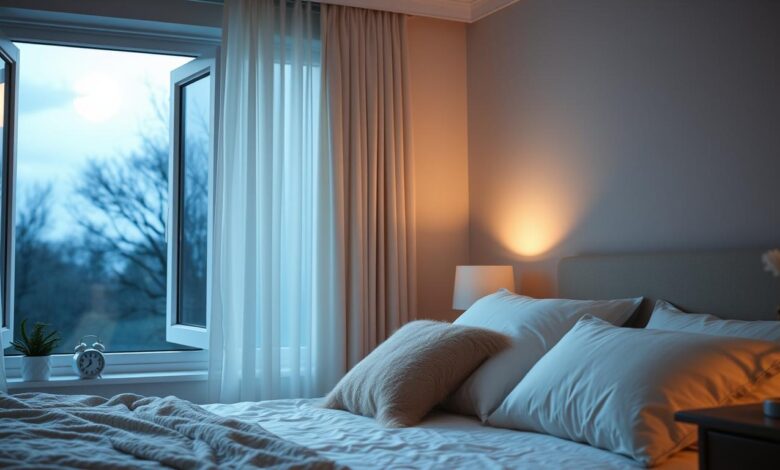Tips for Achieving Optimal Sleep Health

Getting enough sleep is key for our health and happiness. Sleep is essential for our daily lives. It boosts our mood, energy, and health.
Knowing how important sleep is can change our lives. By making our sleep space better and following good sleep habits, we can feel better. Optimal sleep is about finding the right balance for our bodies and minds.
We aim to give you a full guide to better sleep. This includes the basics of sleep, how to make your sleep space great, and tips for better sleep. With this guide, you can take charge of your sleep and make choices that improve your life.
Introduction to Optimal Sleep
Sleep is a big part of our health, and it’s vital to understand its role. By focusing on sleep, we can feel better, have more energy, and be mentally sharp. Optimal sleep is possible, and it’s something we should all aim for.
Key Takeaways
- Optimal Sleep is crucial for physical and mental well-being
- Good Sleep Quality can improve mood and energy levels
- Creating a sleep-conducive environment is essential for Optimal Sleep
- Developing healthy sleep habits can improve Sleep Health
- Prioritizing Sleep Health can have a significant impact on overall health
- Understanding the importance of Sleep Health is vital for making informed decisions
Understanding Sleep Health Fundamentals
Getting a good night’s sleep is key to our well-being. It’s important to know the basics of sleep health. Sleep cycles, including REM and non-REM sleep, help our bodies and minds recover.
Sleep disruption can harm our daily lives. Lifestyle and environmental factors can mess with our sleep. It’s vital to spot these issues and make changes for better sleep.
The Science Behind Sleep Cycles
Sleep cycles have different stages, each with its own role. Our body repairs and regenerates during these cycles. A full cycle lasts about 90-120 minutes, with three non-REM stages and one REM stage.
Key Components of Healthy Sleep
Healthy sleep includes duration, consistency, and quality. Most adults need 7-9 hours of sleep each night. A regular sleep schedule and a good sleep environment can boost sleep quality.
Common Sleep Disruption Factors
Things like irregular sleep times and heavy meals before bed can disrupt sleep. So can screens and environmental factors like noise and light. Knowing these can help us make better sleep choices.
Understanding sleep cycles and healthy sleep can improve our sleep health. This knowledge helps us make better sleep choices and create a sleep-friendly environment.
| Sleep Stage | Duration | Characteristics |
|---|---|---|
| Non-REM Sleep | 90-120 minutes | Body repair and regeneration |
| REM Sleep | 90-120 minutes | Brain activity and memory consolidation |
Creating the Perfect Sleep Environment
A well-designed Sleep Environment is key for great Sleep Quality. Your Bedroom Setup should be cozy and calm. This makes it easier to fall and stay asleep. Research shows that a dark, quiet, and cool space is best for sleep. It helps your body’s clock and makes sleep deeper.
To make the perfect Sleep Environment, think about these things:
- Lighting: Use blackout curtains or shades to block harsh light. Choose soft, warm lights instead.
- Noise: Get earplugs or a white noise machine to cut down outside noise. This creates a calm space.
- Temperature: Keep the room cool, between 60-67 degrees Fahrenheit. This helps you sleep better.
By focusing on these details, you can make your Bedroom Setup better for sleep. This will help you wake up feeling good. A well-designed Sleep Environment is vital for good sleep health. So, take time to make a space that helps you relax and feel new again.
| Factor | Ideal Condition |
|---|---|
| Lighting | Dark or soft, warm light |
| Noise | Quiet or white noise |
| Temperature | Cool (60-67 degrees Fahrenheit) |
The Impact of Light on Sleep Quality
Understanding how light affects sleep is key to better sleep choices. It’s best to get natural light during the day and avoid artificial light at night. This balance helps keep your body’s internal clock in sync, which is crucial for quality sleep.
Light exposure greatly impacts sleep quality. It’s important to manage it well. Natural light during the day boosts melatonin, a hormone that helps you sleep. On the other hand, artificial light, especially blue light from screens, can lower melatonin levels, making it tough to fall asleep.
Natural vs. Artificial Light Exposure
Keeping a balance between natural and artificial light is key for good sleep. Here are some tips to help you achieve this balance:
- Get outside in the morning to expose yourself to natural light
- Use curtains or blinds to block out artificial light at night
- Avoid screens for at least an hour before bedtime
Blue Light Management Techniques
Blue light from screens can be especially hard on sleep. Here are some ways to manage blue light:
- Use blue light filtering glasses or apps
- Adjust the color temperature of your screens to reduce blue light emission
- Take regular breaks from screens to reduce exposure
By controlling light exposure and reducing blue light, you can improve your sleep and overall health. Remember, a consistent sleep schedule and a sleep-friendly environment are also vital for good sleep health.
| Light Type | Effect on Sleep |
|---|---|
| Natural Light | Regulates body’s internal clock, promotes melatonin production |
| Artificial Light | Suppresses melatonin production, disrupts sleep |
| Blue Light | Suppresses melatonin production, disrupts sleep patterns |
Temperature Regulation for Better Sleep
Getting a good night’s sleep is key for our health and wellbeing. A cool bedroom temperature is important for Sleep Quality. It helps our body’s natural temperature changes during the night.
Studies show that a bedroom temperature between 60°F and 67°F is best for sleep. This range can improve Sleep Temperature and Sleep Quality. You can use heating and cooling systems or choose the right bedding to stay cozy.

- Using light bedding in the summer and heavier bedding in the winter
- Adjusting your thermostat to a cooler temperature at night
- Using fans or air conditioners to keep your bedroom cool
By following these tips, you can make your bedroom better for sleep. This can lead to better Sleep Quality and health.
Nutrition and Sleep Health
Nutrition is key to good sleep. Some foods help, while others can hurt. Eating well before bed can make sleep better. But, heavy meals or caffeine too close to bedtime can mess with sleep.
Hydration is also important for sleep. Drinking water helps keep sleep patterns regular. But, not drinking enough can disrupt sleep. Finding the right balance between food and sleep is crucial for a good night’s rest.
Foods That Promote Sleep
- Tart cherries, which are a natural source of melatonin
- Fatty fish, such as tuna and halibut, which are rich in vitamin B6 and magnesium
- Walnuts, which are a good source of melatonin and serotonin
Timing Your Last Meal
Eating a balanced meal a few hours before bed can help sleep. But, avoid heavy or rich foods that can cause discomfort.
Hydration and Sleep Balance
Drinking water all day helps keep sleep patterns regular. Try to drink at least eight glasses a day. And, avoid caffeinated drinks close to bedtime.
| Food | Sleep-Promoting Nutrients |
|---|---|
| Tart cherries | Melatonin |
| Fatty fish | Vitamin B6, magnesium |
| Walnuts | Melatonin, serotonin |
Exercise and Physical Activity’s Role in Sleep
Regular physical activity boosts sleep quality. It helps set a regular sleep pattern. But, it’s important to exercise at the right time to avoid disturbing sleep.
Exercising too close to bedtime can make it hard to relax and sleep.
Here are some benefits of exercise on sleep:
- Reduces stress and anxiety, making it easier to fall asleep
- Regulates sleep patterns and improves the quality of sleep
- Increases energy levels during the day, reducing the need for naps
Finding the right balance between exercise and sleep is key. The American Heart Association suggests at least 150 minutes of moderate exercise or 75 minutes of vigorous exercise weekly. By adding physical activity to your daily routine and timing it right, you can enhance your sleep quality and overall health.

Consistency is crucial. Try to exercise at the same time each day. Also, avoid intense workouts a few hours before bedtime. By prioritizing exercise and physical activity, you’ll wake up feeling refreshed and ready for the day.
| Benefits of Exercise | Impact on Sleep |
|---|---|
| Reduces stress and anxiety | Improves sleep quality |
| Regulates sleep patterns | Increases energy levels |
Managing Stress for Improved Sleep Health
Stress can really mess with your sleep, affecting many people around the world. To fight this, it’s key to use Stress Management techniques. Try adding Relaxation Techniques like deep breathing, muscle relaxation, or meditation to your day.
Here are some Relaxation Techniques that can help with Sleep Health:
- Yoga: mixes movement with deep breathing and meditation
- Mindfulness meditation: keeps you in the present, reducing worries about the past or future
- Journaling: helps you process your feelings and clear your mind before bed
By using these methods, you can better your Sleep Health and overall life. Remember, managing stress is key to good sleep. So, try different Relaxation Techniques to see what works for you.
Improving your sleep and managing stress takes time and patience. Be kind to yourself, and don’t be afraid to ask for help if you need it. With the right Stress Management and Relaxation Techniques, you can wake up feeling new and refreshed.
| Relaxation Technique | Benefits for Sleep Health |
|---|---|
| Deep Breathing | Reduces stress and anxiety, promoting relaxation |
| Progressive Muscle Relaxation | Releases physical tension, preparing the body for sleep |
| Mindfulness Meditation | Improves sleep quality by reducing mind racing and stress |
Establishing a Consistent Sleep Schedule
A consistent sleep schedule is key to regulating your body’s internal clock. Going to bed and waking up at the same time every day boosts Sleep Quality. It helps your body follow a routine, making it easier to fall and stay asleep.
To set up a consistent Sleep Schedule, try these tips:
- Set a regular bedtime and wake-up time, even on weekends or during vacations
- Gradually adjust your sleep schedule if needed, to avoid disrupting your body’s internal clock
- Establish a relaxing bedtime routine to signal to your body that it’s time to sleep
By focusing on Consistency and a regular Sleep Schedule, you can enhance your sleep quality. This means waking up feeling rested and ready for the day. Remember, a consistent sleep schedule is crucial for great Sleep Quality.
With a consistent sleep schedule, you can better regulate your body’s internal clock. Follow these tips and value consistency. This way, you’ll wake up feeling refreshed and ready to tackle the day.
Technology and Sleep: Finding Balance
Technology can be both good and bad for sleep. It can keep us awake with notifications and blue light. But, it also helps us track and improve our sleep with apps. To balance it, we should avoid screens before bed and use sleep apps wisely.
Adding Digital Wellness to our lives helps us sleep better. We can limit screen time, use blue light filters, and relax before bed. Sleep Tracking tools are also great. They help us see our sleep patterns and make them better.
- Setting a bedtime routine that involves minimal screen time
- Using sleep-tracking apps to monitor and improve sleep quality
- Creating a sleep-conducive environment, such as keeping the bedroom cool, dark, and quiet
Being smart about our tech use and adding digital wellness to our lives helps us sleep better. This way, we can find a balance that improves our sleep and overall health.
Natural Remedies and Sleep Aids
Some people need extra help to sleep well. There are many natural remedies and sleep aids out there. But, it’s important to check if they work and are safe. Natural Remedies like herbal supplements, like valerian root and chamomile, can help you relax and sleep better. Always talk to a doctor before trying any Sleep Aids, like melatonin, to make sure they’re safe and work well.
Here are some Natural Remedies for better sleep:
- Herbal supplements: valerian root, chamomile, and lavender
- Aromatherapy: essential oils like lavender and vanilla
- Relaxation techniques: meditation, deep breathing, and yoga
Choosing the right Sleep Aids is key to good Sleep Health. By talking to doctors and trying Natural Remedies, you can find what works best for you. This can help you sleep better and feel better overall.
Good Sleep Health also means a regular sleep schedule, a comfy sleep space, and a healthy lifestyle. Adding Natural Remedies and Sleep Aids to these habits can make you feel refreshed and ready to go in the morning.
| Natural Remedy | Effectiveness | Safety |
|---|---|---|
| Valerian root | High | Generally safe |
| Chamomile | Moderate | Generally safe |
| Melatonin | High | Safe when used as directed |
Conclusion: Your Path to Better Sleep Health
Getting better sleep is a journey that needs dedication and patience. By using the tips from this article, you can improve your sleep quality. This includes understanding sleep cycles, creating a good sleep environment, managing your lifestyle, and trying natural remedies.
Keep in mind, your path to better sleep is unique. What works for someone else might not work for you. Be patient, try different things, and listen to what your body needs. A holistic approach can help you get the most out of quality sleep.
Start this journey with an open mind and a focus on your health and happiness. Let this article guide you on your way to better sleep and a more vibrant life.
FAQ
What are the key components of healthy sleep?
Healthy sleep includes getting enough sleep each night. It also means having the right mix of REM and non-REM sleep. Keeping a regular sleep schedule is also key.
How does the sleep environment impact sleep quality?
A good sleep environment is vital. It should be dark, quiet, and cool. These conditions help you sleep better.
What is the impact of light exposure on sleep?
Natural light during the day is good. But, avoid artificial light, especially blue light from screens at night. This helps improve your sleep.
How does nutrition affect sleep health?
What you eat can affect your sleep. Eating foods that help sleep and staying hydrated is important. Also, timing your meals right can help.
What is the relationship between exercise and sleep?
Exercise can help regulate your sleep. But, be careful not to exercise too close to bedtime. It can disrupt your sleep.
How can stress management techniques improve sleep health?
Stress can hurt your sleep. Using relaxation techniques and mindfulness can help manage stress. This can improve your sleep quality.
Why is establishing a consistent sleep schedule important?
A consistent sleep schedule is crucial. It helps your body’s internal clock. This can lead to better sleep.
How can technology both disrupt and aid sleep?
Technology can be a problem for sleep, especially with screens and blue light. But, tools and apps can help manage screen time. They can also track your sleep to improve it.
What are some natural remedies and sleep aids that can help with sleep?
Natural remedies like herbal supplements and melatonin can help. But, always talk to a healthcare professional before trying them. They can ensure they’re safe for you.





One Comment